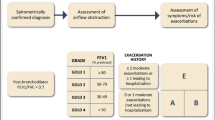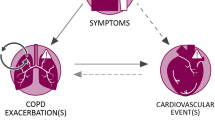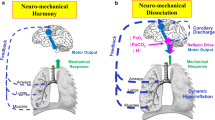Abstract
Chronic obstructive pulmonary disease (COPD) is now considered among the top three contributors to mortality globally. There is limited understanding surrounding the contribution of magnesium to the progression of COPD. This survey aims to evaluate the connection between dietary magnesium intake and both lung function and COPD prevalence among the US population. The research comprised 4865 participants in the National Health and Nutrition Examination Survey (NHANES) program conducted from 2007 to 2012. To evaluate the association between dietary magnesium intake and lung function as well as COPD, the study conducted multiple regression analyses, stratified analyses, and smoothed curves. In this study, we explored the relationship between higher magnesium intake and higher FEV1 [β = 0.21 (95% CI 0.12, 0.30)] and FVC [β = 0.25 (95% CI 0.14, 0.36)] after accounting for all potential confounding factors. We demonstrated a relationship between increased magnesium intake and reduced odds of developing COPD [OR = 0.9993 (95% CI 0.9987, 1.0000)]. The results of stratified analyses further indicated that the relationship between magnesium intake and the risk of COPD is more pronounced in the 40–60 age group and males. The study demonstrated positive associations between the intake of dietary magnesium and both FEV1 and FVC. Additionally, an adverse relationship between magnesium intake and the prevalence of COPD was also observed, suggesting that supplementation with magnesium may be a practical approach to preventing and managing COPD.




Similar content being viewed by others
Data Availability
The datasets generated during and/or analyzed during the current study are available at https://www.cdc.gov/nchs/nhanes/about_nhanes.htm.
Abbreviations
- COPD :
-
chronic obstructive pulmonary disease
- NHANES :
-
National Health and Nutrition Examination Survey
- FVC :
-
forced vital capacity
- FEV 1 :
-
forced expiratory volume in the first second
- BMI :
-
body mass index
- OR :
-
odds ratio
References
Global Strategy for the Diagnosis, Management and Prevention of COPD, Global Initiative for Chronic Obstruction Lung Disease (GOLD). 2023. http://www.goldcopd.org. Accessed 17 October 2023
Liu H, Tan X, Liu Z, Ma X, Zheng Y, Zhu B, Zheng G, Hu Y, Fang L, Hong G (2021) Association between diet-related inflammation and COPD: findings from NHANES III. Front Nutr 8:732099. https://doi.org/10.3389/fnut.2021.732099
Scoditti E, Massaro M, Garbarino S, Toraldo DM (2019) Role of diet in chronic obstructive pulmonary disease prevention and treatment. Nutrients 11(6). https://doi.org/10.3390/nu11061357
Romieu I, Trenga C (2001) Diet and obstructive lung diseases. Epidemiol Rev 23(2):268–287. https://doi.org/10.1093/oxfordjournals.epirev.a000806
Kim T, Choi H, Kim J (2020) Association between dietary nutrient intake and chronic obstructive pulmonary disease severity: a nationwide population-based representative sample. Copd 17(1):49–58. https://doi.org/10.1080/15412555.2019.1698530
Smit HA, Grievink L, Tabak C (1999) Dietary influences on chronic obstructive lung disease and asthma: a review of the epidemiological evidence. Proc Nutr Soc 58(2):309–319. https://doi.org/10.1017/s0029665199000427
King DA, Cordova F, Scharf SM (2008) Nutritional aspects of chronic obstructive pulmonary disease. Proc Am Thorac Soc 5(4):519–523. https://doi.org/10.1513/pats.200707-092ET
de Baaij JH, Hoenderop JG, Bindels RJ (2015) Magnesium in man: implications for health and disease. Physiol Rev 95(1):1–46. https://doi.org/10.1152/physrev.00012.2014
Tarleton EK (2018) Factors influencing magnesium consumption among adults in the United States. Nutr Rev 76(7):526–538. https://doi.org/10.1093/nutrit/nuy002
Gourgoulianis KI, Chatziparasidis G, Chatziefthimiou A, Molyvdas PA (2001) Magnesium as a relaxing factor of airway smooth muscles. J Aerosol Med 14(3):301–307. https://doi.org/10.1089/089426801316970259
Altura BM, Gebrewold A, Zhang A, Altura BT (2003) Low extracellular magnesium ions induce lipid peroxidation and activation of nuclear factor-kappa B in canine cerebral vascular smooth muscle: possible relation to traumatic brain injury and strokes. Neurosci Lett 341(3):189–192. https://doi.org/10.1016/s0304-3940(03)00134-4
Al Alawi AM, Majoni SW, Falhammar H (2018) Magnesium and human health: perspectives and research directions. Int J Endocrinol 2018:9041694. https://doi.org/10.1155/2018/9041694
Datta PK, Aravindan A, Nath S, Chowdhury SR, Dutta D (2023) Nebulised magnesium sulphate as an adjuvant to the treatment of acute exacerbation of COPD: a systematic review and meta-analysis of randomised controlled trials with trial sequential analysis. Lung India 40(4):339–348. https://doi.org/10.4103/lungindia.lungindia_473_22
Weglicki WB, Mak IT, Phillips TM (1994) Blockade of cardiac inflammation in Mg2+ deficiency by substance P receptor inhibition. Circ Res 74(5):1009–1013. https://doi.org/10.1161/01.res.74.5.1009
Shahi A, Aslani S, Ataollahi M, Mahmoudi M (2019) The role of magnesium in different inflammatory diseases. Inflammopharmacology 27(4):649–661. https://doi.org/10.1007/s10787-019-00603-7
Britton J, Pavord I, Richards K, Wisniewski A, Knox A, Lewis S, Tattersfield A, Weiss S (1994) Dietary magnesium, lung function, wheezing, and airway hyperreactivity in a random adult population sample. Lancet 344(8919):357–362. https://doi.org/10.1016/s0140-6736(94)91399-4
Gilliland FD, Berhane KT, Li YF, Kim DH, Margolis HG (2002) Dietary magnesium, potassium, sodium, and children's lung function. Am J Epidemiol 155(2):125–131. https://doi.org/10.1093/aje/155.2.125
Leng S, Picchi MA, Tesfaigzi Y, Wu G, Gauderman WJ, Xu F, Gilliland FD, Belinsky SA (2017) Dietary nutrients associated with preservation of lung function in Hispanic and non-Hispanic white smokers from New Mexico. Int J Chron Obstruct Pulmon Dis 12:3171–3181. https://doi.org/10.2147/copd.S142237
Butland BK, Fehily AM, Elwood PC (2000) Diet, lung function, and lung function decline in a cohort of 2512 middle aged men. Thorax 55(2):102–108. https://doi.org/10.1136/thorax.55.2.102
Ahmadi A, Eftekhari MH, Mazloom Z, Masoompour M, Fararooei M, Zare M, Hejazi N (2022) Health-eelated quality of life and nutritional status are related to dietary magnesium intake in chronic obstructive pulmonary disease: a cross-sectional study. Clin Nutr Res 11(1):62–73. https://doi.org/10.7762/cnr.2022.11.1.62
Zanforlini BM, Ceolin C, Trevisan C, Alessi A, Seccia DM, Noale M, Maggi S, Guarnieri G, Vianello A, Sergi G (2022) Clinical trial on the effects of oral magnesium supplementation in stable-phase COPD patients. Aging Clin Exp Res 34(1):167–174. https://doi.org/10.1007/s40520-021-01921-z
Centers for Disease Control and Prevention (CDC) National Center for Health Statistics (NCHS) National Health and Nutrition Examination Survey Questionnaire (or Examination Protocol, or Laboratory Protocol) U.S. Department of Health and Human Services, Centers for Disease Control and Prevention; Hyattsville, MD, USA. https://www.cdc.gov/nchs/nhanes/index.htm. Accessed 17 October 2023
Måhlin C, von Sydow H, Osmancevic A, Emtner M, Grönberg AM, Larsson S, Slinde F (2014) Vitamin D status and dietary intake in a Swedish COPD population. Clin Respir J 8(1):24–32. https://doi.org/10.1111/crj.12030
Ghalibaf MHE, Kianian F, Beigoli S, Behrouz S, Marefati N, Boskabady M, Boskabady MH (2023) The effects of vitamin C on respiratory, allergic and immunological diseases: an experimental and clinical-based review. Inflammopharmacology 31(2):653–672. https://doi.org/10.1007/s10787-023-01169-1
Park HJ, Byun MK, Kim HJ, Kim JY, Kim YI, Yoo KH, Chun EM, Jung JY, Lee SH, Ahn CM (2016) Dietary vitamin C intake protects against COPD: the Korea National Health and Nutrition Examination Survey in 2012. Int J Chron Obstruct Pulmon Dis 11:2721–2728. https://doi.org/10.2147/copd.S119448
Lei T, Lu T, Yu H, Su X, Zhang C, Zhu L, Yang K, Liu J (2022) Efficacy of vitamin C supplementation on chronic obstructive pulmonary disease (COPD): a systematic review and meta-analysis. Int J Chron Obstruct Pulmon Dis 17:2201–2216. https://doi.org/10.2147/copd.S368645
Wang Y, Wang J, Chen L, Zhang H, Yu L, Chi Y, Chen M, Cai Y (2022) Efficacy of vitamin D supplementation on COPD and asthma control: a systematic review and meta-analysis. J Glob Health 12:04100. https://doi.org/10.7189/jogh.12.04100
Ahmad S, Arora S, Khan S, Mohsin M, Mohan A, Manda K, Syed MA (2021) Vitamin D and its therapeutic relevance in pulmonary diseases. J Nutr Biochem 90:108571. https://doi.org/10.1016/j.jnutbio.2020.108571
Alfaro TM, Monteiro RA, Cunha RA, Cordeiro CR (2018) Chronic coffee consumption and respiratory disease: a systematic review. Clin Respir J 12(3):1283–1294. https://doi.org/10.1111/crj.12662
Kuo CD, Shiao GM, Lee JD (1993) The effects of high-fat and high-carbohydrate diet loads on gas exchange and ventilation in COPD patients and normal subjects. Chest 104(1):189–196. https://doi.org/10.1378/chest.104.1.189
Kumasaka D, Lindeman KS, Clancy J, Lande B, Croxton TL, Hirshman CA (1996) MgSO4 relaxes porcine airway smooth muscle by reducing Ca2+ entry. Am J Physiol 270(3 Pt 1):L469–L474. https://doi.org/10.1152/ajplung.1996.270.3.L469
Hill J, Lewis S, Britton J (1997) Studies of the effects of inhaled magnesium on airway reactivity to histamine and adenosine monophosphate in asthmatic subjects. Clin Exp Allergy 27(5):546–551
Komaki F, Akiyama T, Yamazaki T, Kitagawa H, Nosaka S, Shirai M (2013) Effects of intravenous magnesium infusion on in vivo release of acetylcholine and catecholamine in rat adrenal medulla. Auton Neurosci 177(2):123–128. https://doi.org/10.1016/j.autneu.2013.03.004
Ferrè S, Baldoli E, Leidi M, Maier JA (2010) Magnesium deficiency promotes a pro-atherogenic phenotype in cultured human endothelial cells via activation of NFkB. Biochim Biophys Acta 1802(11):952–958. https://doi.org/10.1016/j.bbadis.2010.06.016
Author information
Authors and Affiliations
Contributions
Conceptualization, GXG and LZF; Data curation, LZF, LHW and LWZ; Writing – original draft, LZF, LHW, LXY and WYY; Writing – review & editing, HZM; Supervision, GXG. All authors contributed to the article and approved the final version of the manuscript.
Corresponding author
Ethics declarations
Ethics Approval
All NHANES protocols utilized in this study received approval from the CDC’s National Center for Health Statistics Institutional Research Ethics Review Board.
Consent to Participate
Informed consent was obtained from all individual participants included in the study.
Consent for Publication
Not applicable.
Competing Interests
The authors have no relevant financial or non-financial interests to disclose.
Additional information
Publisher’s Note
Springer Nature remains neutral with regard to jurisdictional claims in published maps and institutional affiliations.
Rights and permissions
Springer Nature or its licensor (e.g. a society or other partner) holds exclusive rights to this article under a publishing agreement with the author(s) or other rightsholder(s); author self-archiving of the accepted manuscript version of this article is solely governed by the terms of such publishing agreement and applicable law.
About this article
Cite this article
Lin, ZF., Lin, HW., Liao, WZ. et al. The Association Between Dietary Magnesium Intake with Chronic Obstructive Pulmonary Disease and Lung Function in US Population: a Cross-sectional Study. Biol Trace Elem Res 202, 3062–3072 (2024). https://doi.org/10.1007/s12011-024-04073-z
Received:
Accepted:
Published:
Issue Date:
DOI: https://doi.org/10.1007/s12011-024-04073-z




